The European Commission's Culture Compass for Europe, unveiled on November 12, 2025, by Executive Vice-President Roxana Mînzatu and Commissioner Glenn Micallef, has elicited a predominantly positive response from the cultural ecosystem.
Reactions highlight enthusiasm for its visionary approach while underscoring calls for robust implementation, funding, and artist protections. Overall, the ecosystem views the Compass as a “game changer” and “leap forward”, crediting participatory processes but stressing execution through the proposed Joint Declaration, data hub, and dialogues to realise its 20 actions. Below is an overview of key sentiments from cultural organisations, artists, and sector representatives.
Europa Nostra, the pan-European voice for cultural heritage and leader of the European Heritage Hub, was the first to express enthusiasm, issuing a resounding welcome, stating, “When culture wins, Europe wins.” The organisation praised the Compass's “strategic vision – ‘Europe for Culture – Culture for Europe’” for connecting culture to broader EU goals like sustainability and democracy, crediting the inclusive consultation process.
Secretary General Sneška Quaedvlieg-Mihailović called it a “groundbreaking moment” that elevates cultural heritage centrally in EU priorities. The European Heritage Hub, in a related report, urged embedding the “Cultural Deal for Europe” into the Compass, advocating for at least 2% of the next EU budget (2028-2034) dedicated to culture to bolster democracy and sustainability—reflecting over 1,000 participants in prior debates.
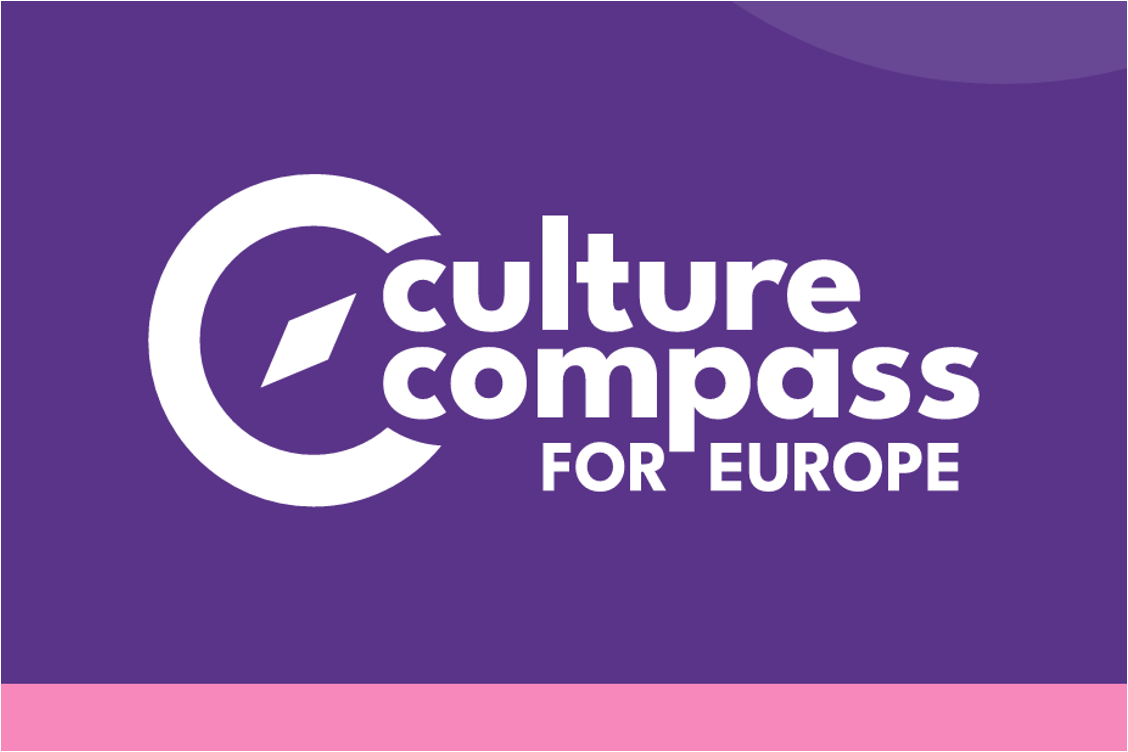
Culture Action Europe (CAE) notes in a first reaction to the strategy that the 20 flagship actions align with sector needs but promises further analysis via their “Sector Blueprint” to ensure alignment with the network's goals: “The strategy is a positive and much-needed step forward, with clear values-driven language that highlights artistic freedom, cultural diversity, inclusion, and participation, and recognises the intrinsic value of culture as a sector in its own right. The network notes that the success of the strategy ultimately hinges on its effective implementation, which requires clarity on funding, particularly given that AgoraEU and other programmes for the 2028–2034 cycle are still under discussion.
In order to enable culture to contribute to EU priorities while thriving across Europe, Culture Action Europe reiterates the Cultural Deal for Europe partners' call for 2% of the next MFF to be dedicated to culture. In a first attempt to unpack the strategy, the network notes that “the Compass shows the direction, yet how far we go will be measured by the strength of our partnerships and commitment to sustained investment. “
In a similar vein, the European Cultural Foundation welcomes the Culture Compass for Europe, praising its vision to centralise culture in EU policy. The organisation calls for robust funding and genuine citizen dialogue and recognises culture's power to strengthen European identity, democracy, and social cohesion through meaningful engagement. “Culture is what binds us as individuals and as communities. It nourishes a sense of belonging, the European sentiment,” it writes in its initial analysis. The ECF calls for strong funding, at least 2% in the next EU budget, and emphasises culture's role in building European identity, solidarity, and democratic values.
Eurocities, representing cities across Europe, backed the initiative, standing “ready to work with the EU to turn its ambitions into local reality,” while calling for robust funding amid the next EU budget negotiations. “In a Europe where 75% of Europeans live in cities, Eurocities looks forward to working with the European Commission to turn this ambition into concrete local action,” stated Mathias De Clercq, President of Eurocities and Mayor of Ghent. The network will collaborate with the EU to implement the Culture Compass by defending artistic freedom, expanding cultural access, promoting inclusive policies, and discussing implementation strategies at the upcoming Eurocities Culture Forum in Gothenburg.
Updated 17/11/2025
IETM welcomes the adoption of the new, consolidated strategy for culture, viewing it as a vital milestone in the EU’s approach to governing and supporting culture. “The discourse of this strategy is, in many ways, refreshing, bold, and valuable. It is not solely driven by crises and anxiety – which is unique in today’s political climate – and does not put competitiveness and security front and centre — but rather invites celebrating Europe’s assets, including its rich cultural diversity, and to explore the versatile potential of culture. IETM notes that the Culture Compass emphasises the essential values of culture, framing it as a “public good”, and highlights culture’s intrinsic value. Europe as a continent is positioned as a “vibrant hub of cultural diversity” and the EU as a “global leader in culture and creativity.” IETM also acknowledges that it is high time “to consistently include and elevate culture’s role in policymaking.” The strong focus on artistic freedom and artists’ working conditions is considered essential for an EU strategic framework for culture. While these breakthroughs can be regarded as a victory for culture advocates, including IETM, the network notes a risk that such victories will remain rhetorical unless concrete, new, and bold measures are implemented. A critical debate takes place on how culture can be genuinely elevated at the policy level.
A Clear Recognition That Artistic Freedom is Under Threat Across Europe
The Artistic Freedom Initiative also welcomed the Commission’s clear recognition that artistic freedom is under threat across Europe. “Artistic Freedom Initiative’s own monitoring has shown how urgently EU-wide, systematic documentation of artistic freedom is needed,” AFI notes in its welcoming statement. “To build on this progress, we urge the Commission to take a further step: consider an EU Artistic Freedom Act to fill the current legislative gap and provide binding protections for artists and cultural workers across the Union.”
IMPALA, representing independent music companies, welcomed the initiative as timely for leveraging Europe's cultural diversity as “social & economic strength & soft power”, expressing eagerness to input on making the EU “the best place in the world to be an artist.”
The Association Européenne des Conservatoires (AEC) committed to contributing and advocating for artistic freedom, diversity, inclusion, and excellence in music education, following a roundtable with music organisations. The EU National Institutes for Culture also welcomed the Compass.
The European Crafts Alliance warmly welcomes the launch of the EU Culture Compass. We consider it a timely and valuable initiative that brings much-needed coherence to how culture is understood within wider European policy priorities.
Joost Heinsius: Stronger Advocacy Efforts Are Needed for Concrete Goals in the EU Artists Charter
 Policy expert, Joost Heinsius comments on the announcement regarding the Culture Compass, which “promises an EU Artists Charter, to outline fundamental principles, guidance, and commitments for fair working conditions in the sectors, and increase compliance and accountability, particularly by recipients of EU funding for culture.” He notes that it will organize an EU high-level exchange with stakeholders and social partners, with the outcomes contributing to the design of the charter. However, he expresses concern that the announcement is “interesting and new,” yet it provides no information about the content of the Charter or the fundamental principles, guidance, and commitments it will encompass.
Policy expert, Joost Heinsius comments on the announcement regarding the Culture Compass, which “promises an EU Artists Charter, to outline fundamental principles, guidance, and commitments for fair working conditions in the sectors, and increase compliance and accountability, particularly by recipients of EU funding for culture.” He notes that it will organize an EU high-level exchange with stakeholders and social partners, with the outcomes contributing to the design of the charter. However, he expresses concern that the announcement is “interesting and new,” yet it provides no information about the content of the Charter or the fundamental principles, guidance, and commitments it will encompass.
“This means the cultural sector needs strong advocacy efforts to make sure this Charter will propose concrete goals and commitments to improve fair pay, fair access to social security and support stronger bargaining powers, especially for the artists who are too often on the weak side of the power balance. Since the Charter also promises increased compliance and accountability for fair working conditions, especially for recipients of EU funding for culture, the Commission has to raise the standards for fair pay in all its programs. This includes culture and how it will enforce these standards,” he concludes.
Elena Polivtseva: “A Vision That Starts From Culture Itself”
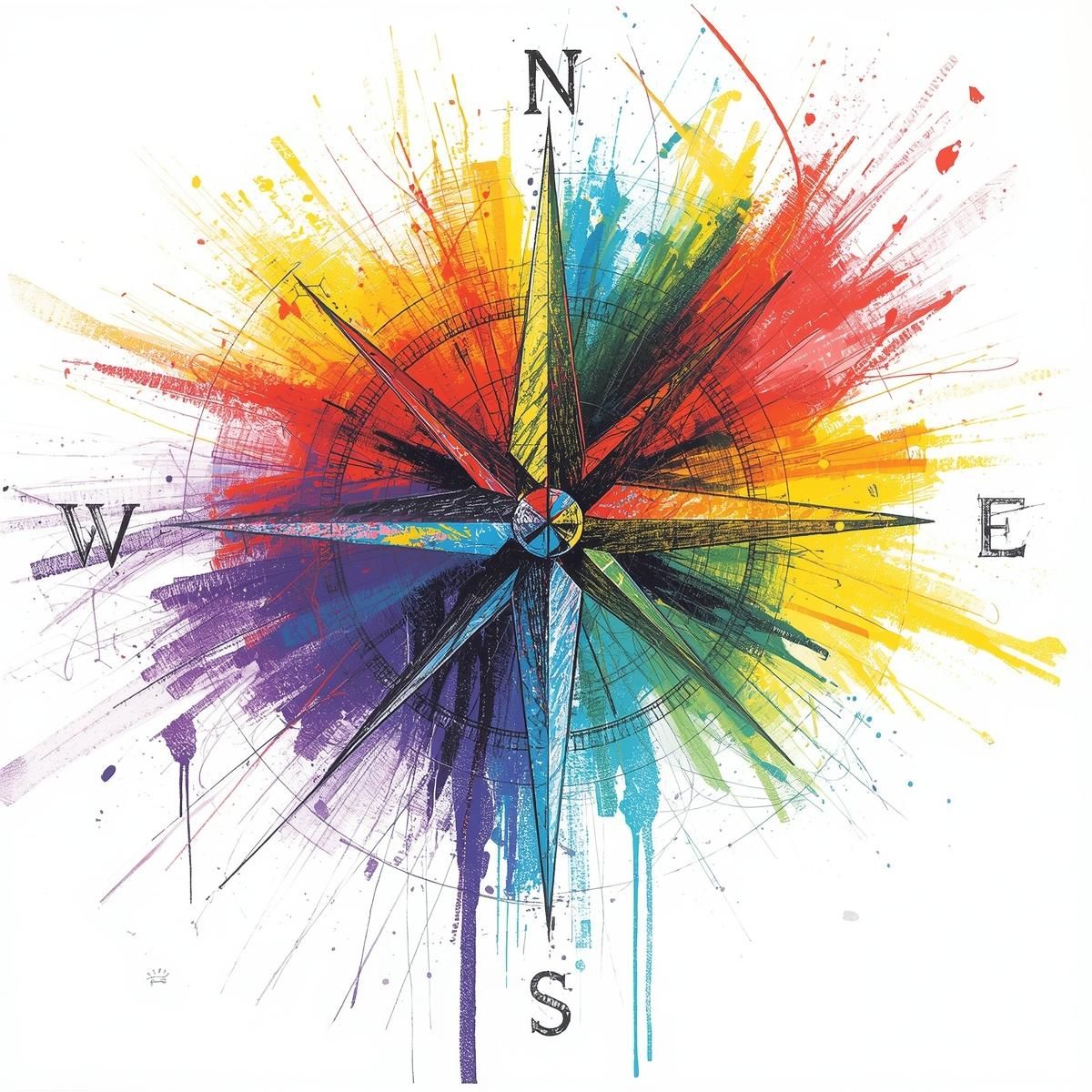 “This is a step forward: a vision that starts from culture itself, not merely from what culture can serve,” comments policy expert Elena Polivtseva on the recent announcement in a comment on LinkedIn. “Earlier frameworks such as the New European Agenda for Culture overemphasised culture's contribution to other policy fields. This new strategy rebalances three essential dimensions: the needs of cultural sectors, citizen participation, and culture's broader spillovers,” she adds. Overall, Polivtseva believes the Culture Compass “succeeds in acknowledging the value of culture and recognising the sector’s key challenges.” However, she points out its shortcomings in translating rhetoric into action, as some measures are either too general or overly tied to existing initiatives. Finally, she concludes that “the strength of any vision lies in its implementation,” asserting that the Culture Compass is a milestone that requires stronger numbers in the next EU budget.
“This is a step forward: a vision that starts from culture itself, not merely from what culture can serve,” comments policy expert Elena Polivtseva on the recent announcement in a comment on LinkedIn. “Earlier frameworks such as the New European Agenda for Culture overemphasised culture's contribution to other policy fields. This new strategy rebalances three essential dimensions: the needs of cultural sectors, citizen participation, and culture's broader spillovers,” she adds. Overall, Polivtseva believes the Culture Compass “succeeds in acknowledging the value of culture and recognising the sector’s key challenges.” However, she points out its shortcomings in translating rhetoric into action, as some measures are either too general or overly tied to existing initiatives. Finally, she concludes that “the strength of any vision lies in its implementation,” asserting that the Culture Compass is a milestone that requires stronger numbers in the next EU budget.
Not to be missed: On 19 November 2025 at 11:00 CET, Culture Action Europe will host a public online meeting with guest speakers from DG EAC. The meeting will see the speakers walk participants through the Culture Compass, share their initial thoughts, and create an open space for collective consideration of the Compass.
Culture Compass for Europe spotlights Artistic Freedom and Fair Working Conditions
“Europe for Culture, Culture for Europe” is the vision of the Commission's new strategy, initiating Joint declaration by the European Commission, Parliament and Council. While “artists should be free to create without fear of interference”, “applause does not pay for the rent” and “creators should have full control of their content” in the AI era, the Compass reflects AgoraEU structure as linked with civil society and democracy, the latter considered under threat. Read on.
Wednesday 12 November - The Culture Compass for Europe was adopted today by the College of Commissioners. The new strategy sets a strategic lens for culture across EU policies, with a special focus on democracy, which is considered by the European Commission as under threat. Following months of public consultations and civil society campaigns, the Culture Compass for Europe prioritizes artistic freedom and fair working conditions for artists and cultural professionals.
Quoting Jean Monnet’s alleged phrase on re-starting the European project from culture, Roxana Mînzatu - Executive Vice-President for Social Rights and Skills, Quality Jobs and Preparedness introduced culture as “our shared values, our freedoms, our identity”, “not as a second or third-tier priority” but as “THE story of Europe”, deserving "budget, our attention" and “our political engagement”.
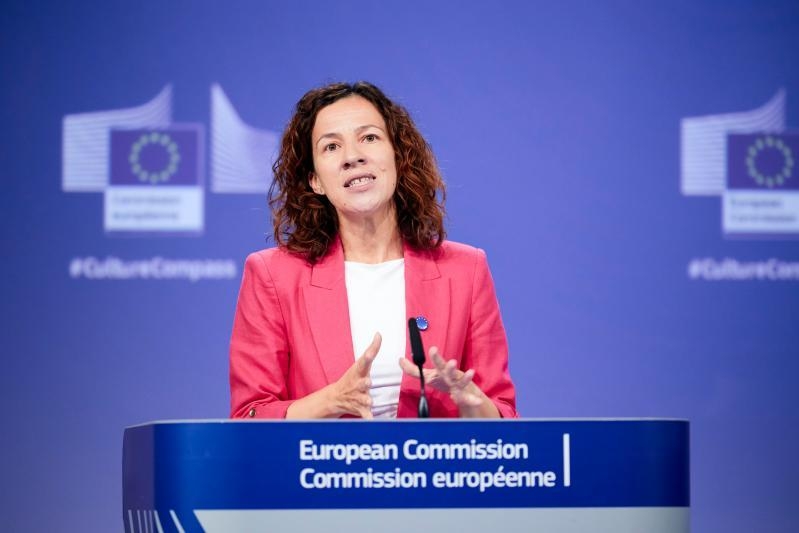
The Executive Vice-President approached culture as a foundation of European identity and as power for growth, innovation and inclusion. She underscored that “culture is inseparable from technology”, while “AI must be a tool for creators and not a threat to their rights”.
She announced a Joint Declaration on 'Europe for Culture - Culture for Europe' as high-level political commitment of the European Parliament, Council and the Commission “in building a future where Europe stands for culture, and culture stands for Europe”. The declaration may be expected before the end of 2025.
"When Culture Wins in Europe, Europe Wins!"
“Culture is our next strategic frontier,” said Glenn Micallef, Commissioner for Intergenerational Fairness, Youth, Culture and Sports, setting the stage for a vision of culture mainstreamed horizontally and at the heart of EU policies, since “When Culture Wins in Europe, Europe Wins!”.
The Commissioner approached a European culture that “creates, works, empowers, connects and wins” and introduced 20 flagship actions. These actions of the Compass are structured under a Vision: Europe for Culture - Culture for Europe, four key directions: Values and Rights/ Artists and People/ Competitiveness, Resilience, Cohesion / International and a final category on Investments.
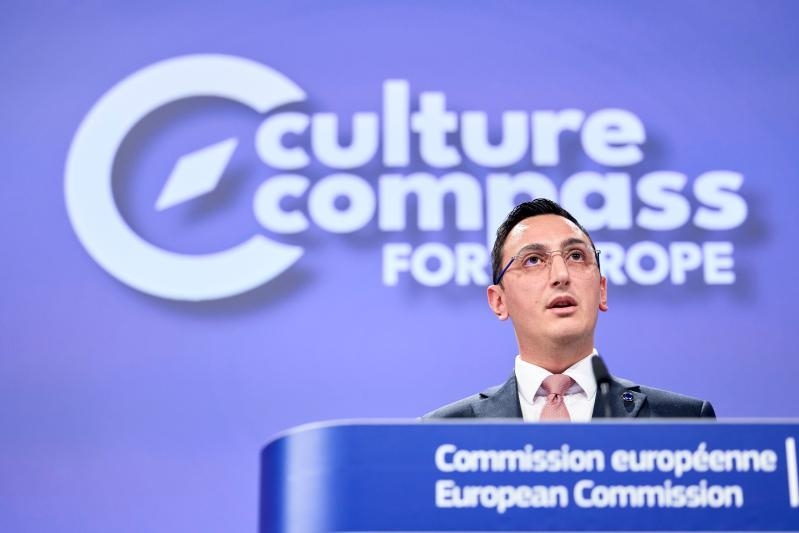
Following Mînzatu’s statement “We stand for artistic freedom. For the right of every artist to create without fear or interference,” Commissioner Micallef affirmed that “Free artists are the voice of democracy”. He announced key actions including a 'State of Culture' in the EU Report to serve as a yearly snapshot on artistic freedom and other culture evolutions in Europe, along with an 'EU Cultural Data Hub' to support informed policymaking with reliable monitoring data, expected the third quarter of 2027 (click on image to enlarge).

As “too many” of the nearly eight million CCS professionals in the EU face insecurity” and “applause does not pay for the rent”, the Commissioner proposed an 'EU Artists Charter' to set out concrete commitments for fair working conditions, to be expected around the second quarter of 2027.
Affirming “creators to remain in control of their content,” the Commissioner introduced an upcoming 'AI Strategy for Culture and Creativity', promoting ethical use of AI and collaboration between the Techs and CCS.
Cultural rights especially for the youth are set as well in the Compass’ spotlight, reflecting EU priorities on youth and drawing from UNESCO and the recent evolutions in MONDIACULT 2025 on cultural rights. “Youth access to culture is a priority. Culture teaches our youth to think critically and shields them from division and extremism. We hope to transform our vision into achievements,” commented the Commissioner during the Q&A session of the press conference.
Media Freedom to strengthen Democracy and Civil Society
The Compass was announced along with and as closely intertwined with two more new strategies. Earlier today, Henna Virkkunen, Executive Vice-President for Tech Sovereignty, Security and Democracy and Michael McGrath, Commissioner for Democracy, Justice, the Rule of Law and Consumer Protection announced the European Democracy Shield and the first ever Civil Society Strategy, as linked with the upcoming Joint Declaration on Culture for Europe and with the proposed AgoraEU programme 2028-2034.
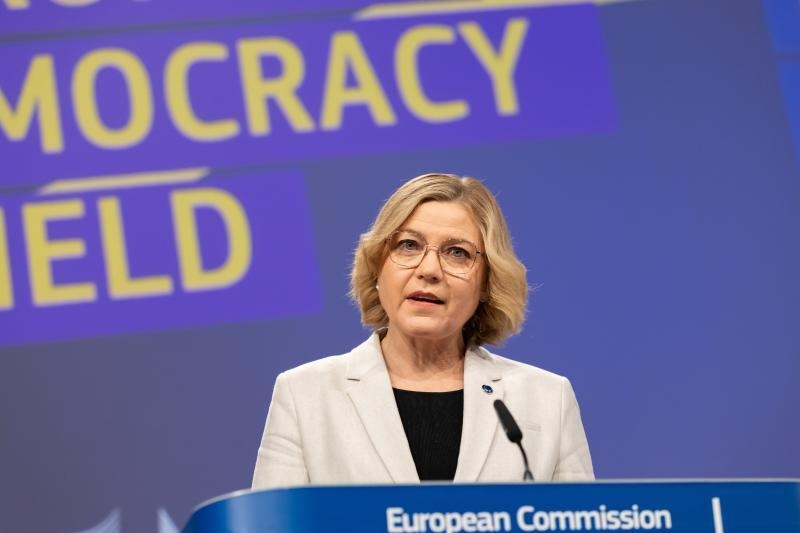
Executive Vice-President Henna Virkkunen, stated that “Our democracy is under pressure and under attack [...] we need to stand up and protect it”. Along similar lines, Commissioner McGrath stated that “The Democracy Shield is about preserving the information space for people to express freely and exercise their democratic rights across Europe” as “our democracy is precious and needs to be protected at all times” and “against online and offline threats”.
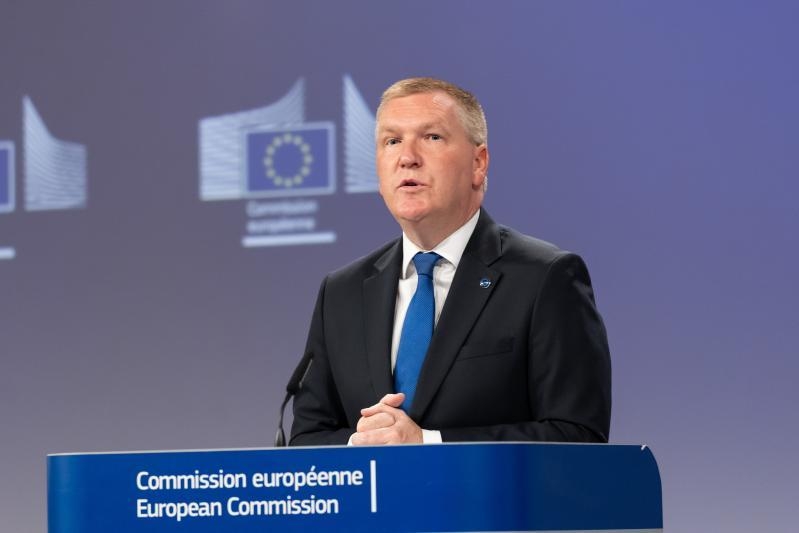
They announced a “New European civil society platform”, to be expected next year and enabling direct consultations with the Commission on EU values and rights. They also announced funding for civil society to help organizations to face political or legal harassment and “stand on their feet”.
Background and Overview
The development of a Culture Compass for Europe was assigned to Commissioner Glenn Micallef in the mission letter for his portfolio, delivered in 2024.
Milestones in the process included the Commission’s call for evidence where feedback by CCS organizations prioritized funding, (artistic) freedom and fair working conditions, the 3Fs of priority for CCS civil society. Further public consultations were organized and dialogues with the Cult Committee and Members of the European Parliament.
Summing up, strengthening links between culture, media, democracy and civil society were expected, as the Culture Compass would reflect the logic of the structure of the AgoraEU, the funding programme in the next MFF 2028-2034, announced in July 2025.
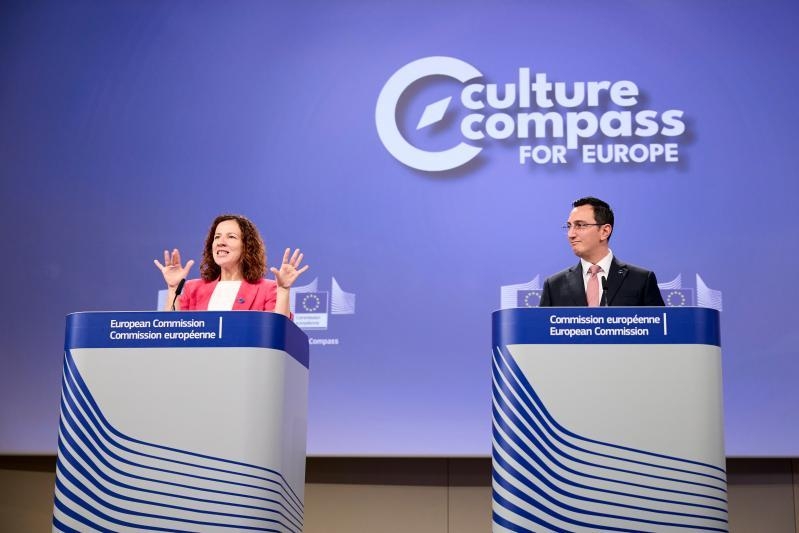
Culture’s role on the competitiveness of the EU was also highlighted, emphasizing the important contribution of the CCS to employment, among other critical factors for the European economy and society.
Underscoring European values as linked with identity and unity, the Compass was introduced as key to European security in a world of geopolitical uncertainty. The idea of “Europe under threat” reaffirms President von der Leyen’s words in SOTEU 2025, though not including an explicit refrence to culture at the time.
Find the press conference here
Header Image by Jai79 from Pixabay - Free for use under the Pixabay Content Licence
Images: Courtesy of the European Commission - (c) European Union, 2025








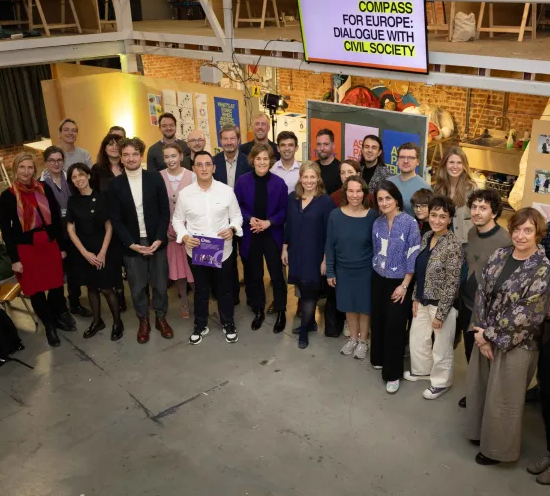

 Policy expert, Joost Heinsius comments on the announcement regarding the Culture Compass, which “promises an EU Artists Charter, to outline fundamental principles, guidance, and commitments for fair working conditions in the sectors, and increase compliance and accountability, particularly by recipients of EU funding for culture.” He notes that it will organize an EU high-level exchange with stakeholders and social partners, with the outcomes contributing to the design of the charter. However, he expresses concern that the announcement is “interesting and new,” yet it provides no information about the content of the Charter or the fundamental principles, guidance, and commitments it will encompass.
Policy expert, Joost Heinsius comments on the announcement regarding the Culture Compass, which “promises an EU Artists Charter, to outline fundamental principles, guidance, and commitments for fair working conditions in the sectors, and increase compliance and accountability, particularly by recipients of EU funding for culture.” He notes that it will organize an EU high-level exchange with stakeholders and social partners, with the outcomes contributing to the design of the charter. However, he expresses concern that the announcement is “interesting and new,” yet it provides no information about the content of the Charter or the fundamental principles, guidance, and commitments it will encompass.  “This is a step forward: a vision that starts from culture itself, not merely from what culture can serve,” comments policy expert Elena Polivtseva on the recent announcement in a comment on LinkedIn. “Earlier frameworks such as the New European Agenda for Culture overemphasised culture's contribution to other policy fields. This new strategy rebalances three essential dimensions: the needs of cultural sectors, citizen participation, and culture's broader spillovers,” she adds. Overall, Polivtseva believes the Culture Compass “succeeds in acknowledging the value of culture and recognising the sector’s key challenges.” However, she points out its shortcomings in translating rhetoric into action, as some measures are either too general or overly tied to existing initiatives. Finally, she concludes that “the strength of any vision lies in its implementation,” asserting that the Culture Compass is a milestone that requires stronger numbers in the next EU budget.
“This is a step forward: a vision that starts from culture itself, not merely from what culture can serve,” comments policy expert Elena Polivtseva on the recent announcement in a comment on LinkedIn. “Earlier frameworks such as the New European Agenda for Culture overemphasised culture's contribution to other policy fields. This new strategy rebalances three essential dimensions: the needs of cultural sectors, citizen participation, and culture's broader spillovers,” she adds. Overall, Polivtseva believes the Culture Compass “succeeds in acknowledging the value of culture and recognising the sector’s key challenges.” However, she points out its shortcomings in translating rhetoric into action, as some measures are either too general or overly tied to existing initiatives. Finally, she concludes that “the strength of any vision lies in its implementation,” asserting that the Culture Compass is a milestone that requires stronger numbers in the next EU budget.




